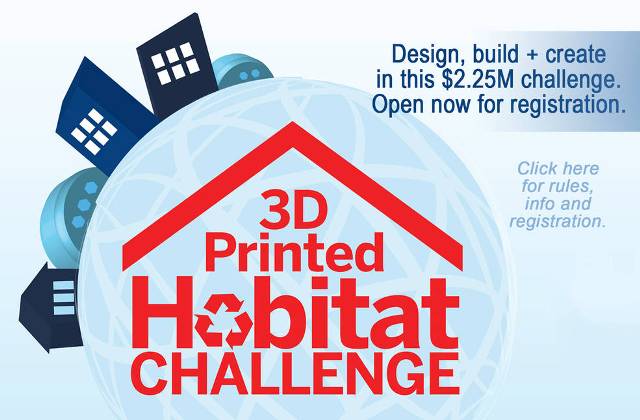May 18 2015
NASA and America Makes are hosting a novel $2.25 million competition, which involves designing and constructing a 3D-printed habitat for deep space exploration. This competition will be conducted in two phases keeping in mind NASA’s journey to Mars.

Image Credit: NASA
The 3D-printed habitat challenge falls under NASA's Centennial Challenges program and aims to promote additive construction technology which is an essential factor needed to develop solutions for sustainable housing not only on Earth but also beyond.
Housing is one of the top requirements for human beings; however constructing a habitat in another planet would require transporting tons of materials and equipment, which would in turn occupy precious cargo space needed for other life-sustaining rations.
One invaluable option could be to use indigenous materials along with material from the spacecraft generally left as waste to develop a habitat.
The first phase of the 3D-printed habitat challenge was announced on May 16 at the Bay Area Maker Faire in San Mateo, California, and will extend up to September 27. This initial level of the competition involves design, where participants have to prepare advanced architectural concepts using 3D printing. A cash prize of $50,000 will be awarded at the 2015 World Maker Faire in New York after top 30 submissions are judged.
"The future possibilities for 3D printing are inspiring, and the technology is extremely important to deep space exploration," said Sam Ortega, Centennial Challenges program manager. "This challenge definitely raises the bar from what we are currently capable of, and we are excited to see what the maker community does with it."
The 3D-printed habitat challenge’s second phase has been split into two levels. Level one is called the structural member competition and will focus on fabrication technologies required to construct structural parts from a mixture of indigenous materials and recyclables, or just indigenous materials.
Level 2 is called on-site habitat competition, and participants are challenged to create extensive habitats using indigenous materials or indigenous materials blended with recyclables. Both the levels are open for registration on Sept. 26, and each level carries a $1.1 million prize.
Based on the winning concepts and products, NASA will be able to put together the technical expertise for transporting habitat-manufacturing machines to destinations such as Mars so as to construct homes for space explorers.
The ideas from the competition are also likely to be implemented to build economical housing in remote locations on Earth where access to traditional building materials is restricted.
"America Makes is honored to be a partner in this potentially revolutionary competition," said Ralph Resnick, founding director of America Makes. "We believe that 3D printing/Additive Manufacturing has the power to fundamentally change the way people approach design and construction for habitats, both on earth and off, and we are excitedly awaiting submissions from all types of competitors.”
America Makes is a public/private partnership of organizations focused on accelerating the capabilities and adoption of additive manufacturing technology. The Centennial Challenges Program is managed at NASA's Marshall Space Flight Center in Huntsville, Alabama for the agency’s Space Technology Mission Directorate in Washington.